The Intel Core Ultra 7 155H Review: Meteor Lake Marks A Fresh Start To Mobile CPUs
by Gavin Bonshor on April 11, 2024 8:30 AM ESTASUS Zenbook 14 OLED UX3405MA: Rendering & Simulation Performance
Rendering tests are often a little more simple to digest and automate than others. All the tests give out some sort of score or time, usually in an obtainable way that makes it fairly easy to extract. These tests are some of the most strenuous in our list due to the highly threaded nature of rendering and ray-tracing, and they can draw a lot of power. Power isn't so much a problem on mobile platforms, but rendering performance and how it relates to varied workloads such as video editing, is still a vital part of overall performance.
Different from rendering, in our Simulation section, these tests act more like synthetic benchmarks but, at some level, are still trying to simulate a given environment.
For this review, we have included the AMD Ryzen 9 7940HS, which includes the same Radeon 780M integrated graphics, along with the Ryzen 5 8600G, which uses the AMD Phoenix mobile architecture but is adopted for desktops. This allows us to show more data points for our review of Intel's Meteor Lake-based Core Ultra 7 155H to see where performance lies.
Despite including AMD's Phoenix-based Ryzen 8000G APUs in our results, as we expand our list of notebooks tested, we'll have more effective and comparable data points in the future. To add more reference, all of the chips have been tested with Windows 11 22H2.
Rendering
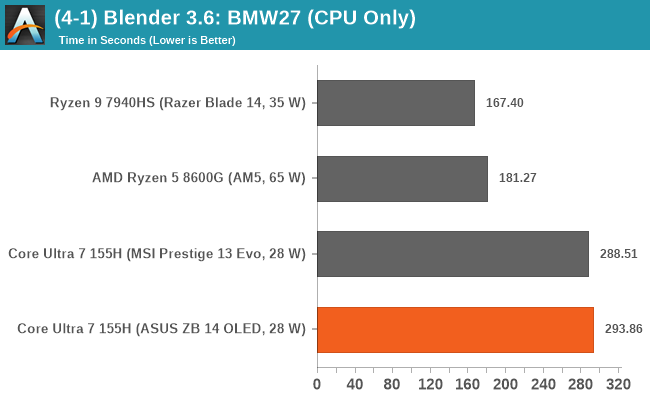
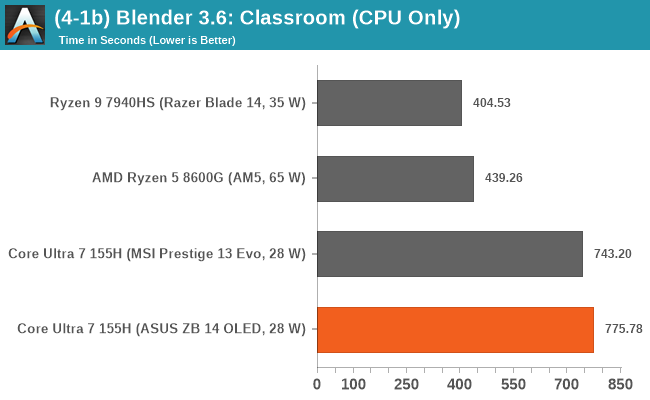
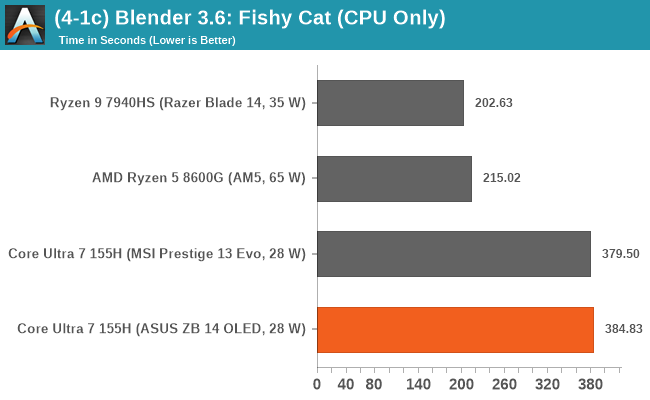
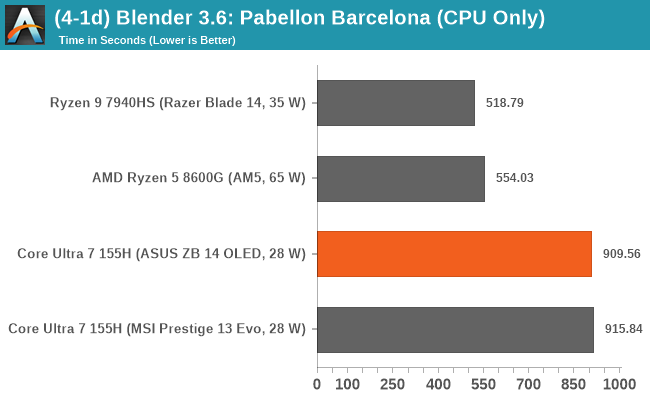
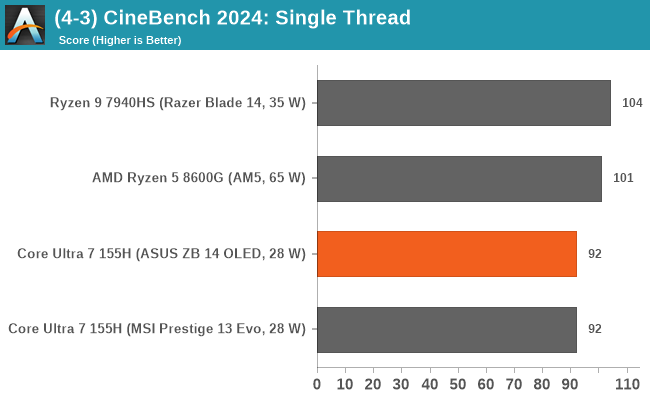
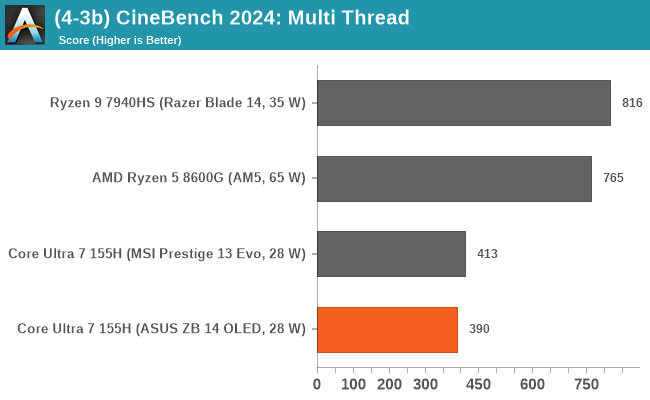
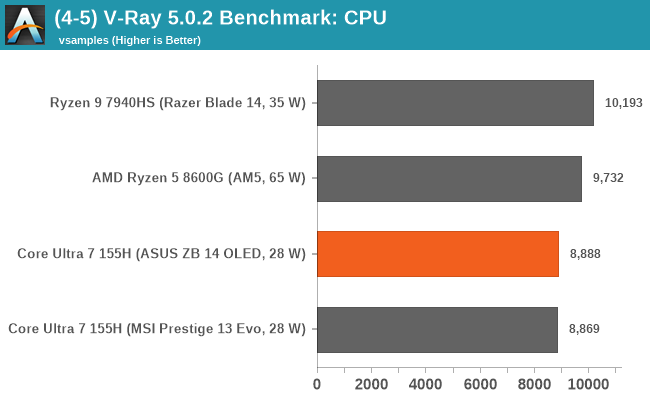
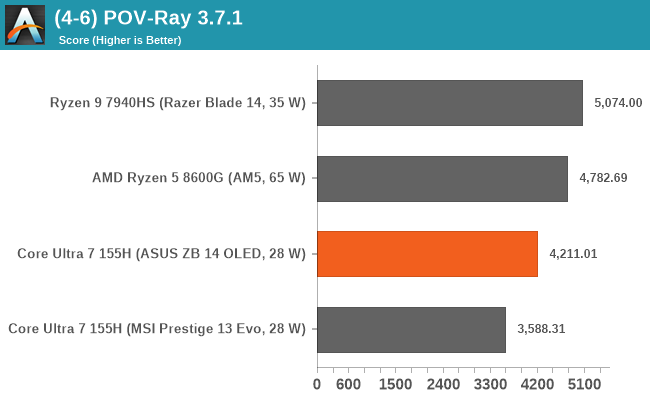
As we can see from our rendering results, the Intel Core Ultra 7 155H is quite competitive in single-threaded performance and is a little behind AMD's Zen 4 mobile Phoenix-based Ryzen 9 7940HS. The situation changes somewhat when we move to multi-threaded performance, with the Meteor Lake notebooks lagging behind in all Blender 3.6 tests. Things look better in our POV-Ray test, with a competitive showing, and there is a similar situation in the V-Ray benchmark.
Simulation
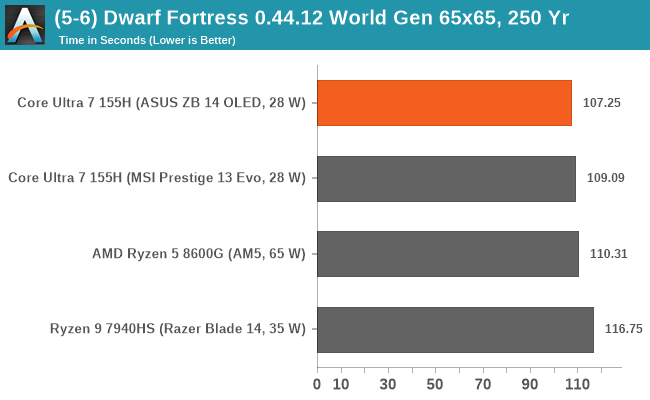
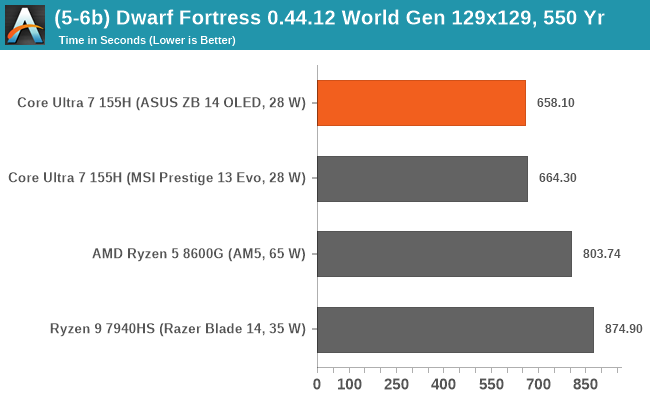
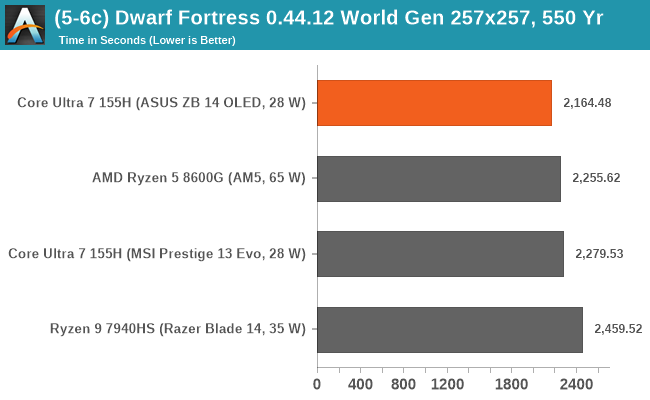
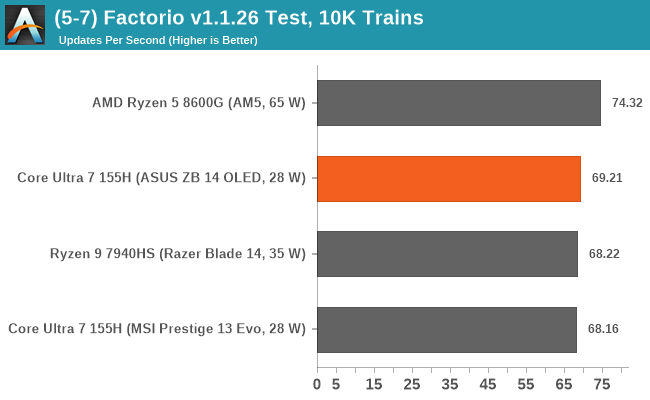
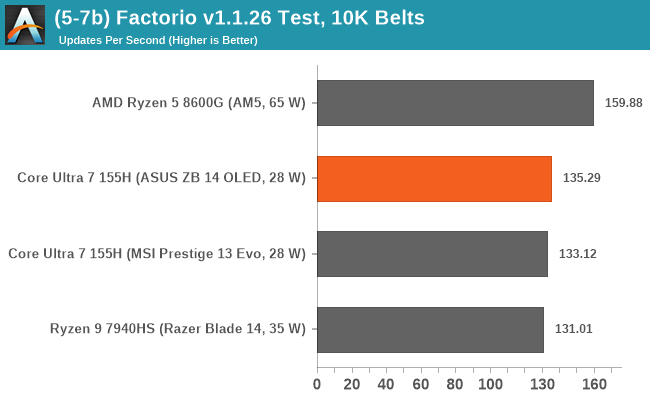
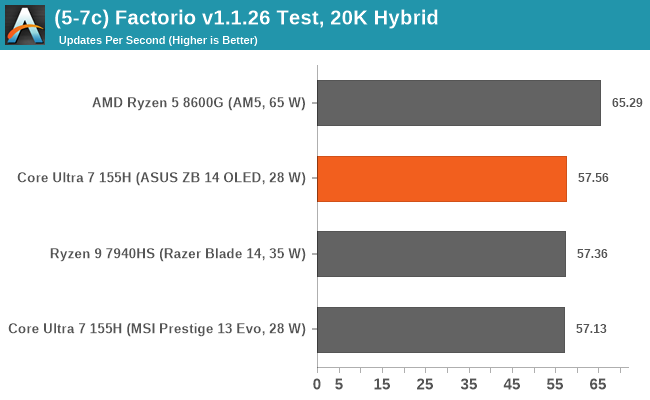
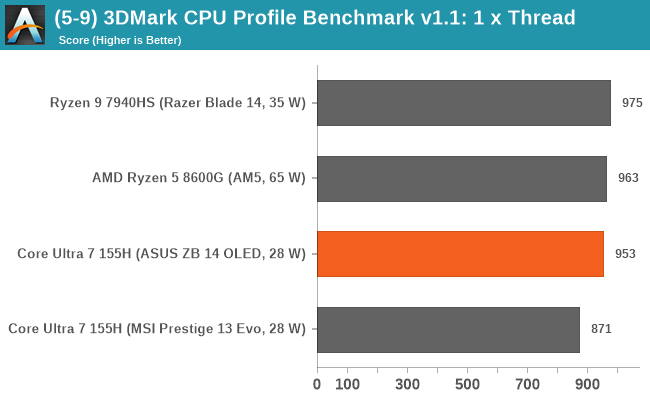
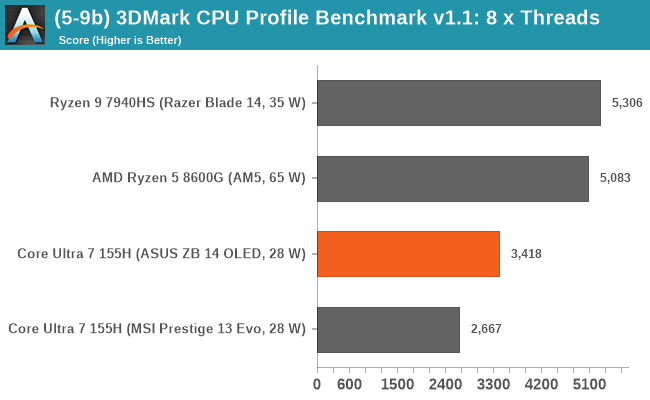
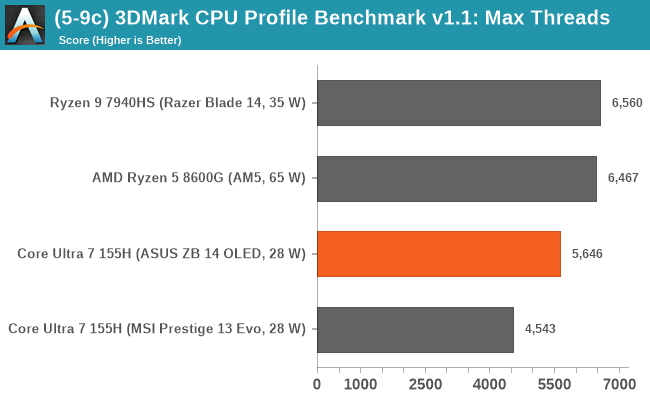
Our simulation benchmarks show that the Intel Core Ultra 7 155H outperforms the Ryzen 9 7940HS and even the desktop Ryzen 8000G series processors in Dwarf Fortress. In our Factorio tests, Meteor Lake is also very competitive with the AMD Phoenix-based chips, although the AMD chips perform better in the 3D Mark CPU profile with maximum threads.










69 Comments
View All Comments
Dante Verizon - Thursday, April 11, 2024 - link
Too strange... in the spec2017 test that represents Blender MeteorLake wins but in the real Blender test it loses? GreatDante Verizon - Thursday, April 11, 2024 - link
The iGPU performance of desktop APUs is also abnormally low.Gavin Bonshor - Friday, April 12, 2024 - link
Could you please elaborate? Did another publication's results land higher? Did they run JEDEC memory settings?ballsystemlord - Thursday, April 11, 2024 - link
That near 50% increase in DRAM access latency coupled with the higher thermal limitations is probably what's holding the 115H back.Ryan Smith - Thursday, April 11, 2024 - link
Keep in mind that they're different workloads with different versions of Blender. The version in SPEC2017 is from 7 years ago, which was the Blender 2.7 era.mode_13h - Monday, April 15, 2024 - link
spec2017 is using an old version of Blender that's frozen in time. That's needed to make all spec2017 results comparable with each other.In the individual Rendering benchmarks, Gavin used a reasonably current version of Blender (3.6 is a LTS release from June 27, 2023), probably also built with a different compiler.
Hulk - Thursday, April 11, 2024 - link
"AMD Arc" in GPU specs?Gavin Bonshor - Friday, April 12, 2024 - link
Yeah, that was a really weird one. It has since been corrected.Fozzie - Thursday, April 11, 2024 - link
Why is the text seemingly out of line with the actual results? Repeatedly it is describing wins for the U7 155H that don't seem to be backed up in the actual benchmarks. For example:"As we can see from our rendering results, the Intel Core Ultra 7 155H is very competitive in single-threaded performance and is ahead of AMD's Zen 4 mobile Phoenix-based Ryzen 9 7940HS."
Actually, the graphs don't show a single instance of the Ultra 7155H besting the Ryzen 9 7940HS in ALL of the preceding graphs.
"Looking at performance in our web and office-based testing, in the UL Procyon Office-based tests using Microsoft Office, the Core Ultra 7 155H is actually outperforming the AMD Ryzen 9 7940HS, which is a good win in itself."
How is 6,792 greater than 7,482? How is 6,978 higher than 7,162?
Did the benchmarks get updated after the text was written? Did someone write the summary text and not pay attention to "Higher is better" vs "Lower is better"?
phoenix_rizzen - Thursday, April 11, 2024 - link
The text describing the Spec tests are also incorrect."Even though the Core Ultra 7 155H is technically an SoC, it remains competitive in the SPECint2017 section of our single-thread testing against the Ryzen 9 7940HS. The AMD chip performs better in two of the tests (525.x264_r and 548.exchange2_r); on the whole, Intel is competitive."
Except the graph shows the AMD system beating the Intel system in 7 tests and only losing by a small margin in 3 of them. The AMD system even beats the Intel desktop system in 4 tests and ties it in 1.
"In the second section of our single-threaded testing, we again see a very competitive showing in SPECfp2017 between the Intel Core Ultra 7 155H and the AMD Ryzen 9 7940HS. The only test we see a major gain for the Ryzen 9 7940HS is in the 503.bwaves_r test, which is a computational fluid dynamics (CFD) simulation."
Except the AMD system wins in 4 tests, essentially ties in 5 tests, and only loses in 2. It even beat the desktop system in 3 tests.
The text is nowhere near consistent with the graphs.